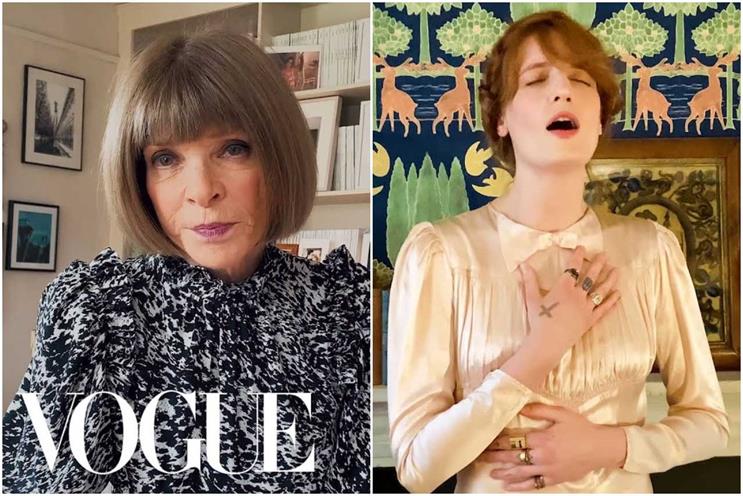
It was set to be a night of dramatic fashion moments. The annual Met Gala was due to celebrate the 25th anniversary of Vogue editor-in-chief Anna Wintour’s role as organiser of the event and chairman of The Metropolitan Museum of Art’s Costume Institute.
But this year’s "first Monday in May", as the event is often referred to, was postponed due to Covid-19 and, in its place, the publisher delivered a live stream to mark the day and promote fundraising for both the institute and the Council of Fashion Designers America’s A Common Thread initiative, alongside online content celebrating the annual extravaganza.
"A Moment with the Met" was live-streamed on Vogue’s YouTube channel, with an introduction by Wintour, a brief history of the event and a performance by Florence + the Machine, followed by a DJ set by Louis Vuitton menswear artistic director and Off-White founder Virgil Abloh.
But for a time-rich audience in lockdown, did it offer a flavour of the exclusive event and a much-need moment of escapism? ±±ľ©Čüłµpk10 asked a selection of agencies to review it.
 Nick Stickland
Nick Stickland
Founder and executive creative director, Odd
One thing that Vogue has done so well with the Met Gala is remind us of the importance of non-traditional thinking. Whether it’s Harry Styles interpreting the camp theme alongside Alessandro Michele in Gucci or Rihanna’s meme-spawning custard-coloured 2015 Guo Pei masterpiece. Under the helm of Anna Wintour, the event has cemented both itself and the magazine in cultural conversation for the last two decades.
Is a short content series live-streamed on YouTube the most innovative approach? Probably not. Does it step on the toes of many other brands who have enlisted the help of Virgil et al to entertain their followers? Perhaps. But, most importantly, what the current situation is providing us with is a moment of pause. It’s a time to stop, reflect and acknowledge. And ensure we’re approaching the future with the most relevant strategies. There’s no way to digitally recreate the furore of watching the extraordinary costumes stream up the steps of the Met. But I, for one, am very happy to reflect and applaud all of the wonderful moments of years gone by.
.jpeg) Simon Labbett
Simon Labbett
Partner and executive creative director, Truant
Although the world has far more to worry about than celebrity and fashion, you could argue that Vogue’s attempt to recreate a virtual version of every fashionista’s annual highlight was a much-needed moment of escapism. But "A Moment with the Met" turned out to be nothing more than a live stream of Anna Wintour and Florence Welch – surely a disappointment to anyone who stayed up late for the "big reveal" (diehard Flo fans aside). Supporting Wintour’s intro with look-back content from the likes of Naomi Campbell was a smart way to keep the story going. But there seemed very little attempt to whip up anticipation or digitally recreate the live event’s signature razzmatazz. There just wasn’t enough to engage. Then again, maybe you’ve got to hand it to Vogue for valiantly trying to fly the fashion flag in the middle of an apocalypse.
 Jodie Fullagar
Jodie Fullagar
Joint managing director, M&C Saatchi Sport & Entertainment
This was an idea inspired by great intentions – to mark the first Monday in May with an online tribute to the Met Gala and a financial appeal to support both the institute and The Common Thread initiative felt entirely appropriate, authentic and respectful. Anna Wintour’s opening address struck a perfect tone in positioning the initiative and its place in the context of the wider crisis.
However, the execution and desired impact had its shortcomings – arguably almost entirely related to the limitations of the "virtual event" concept. By their nature, virtual experiences in isolation in place of real, tangible and physical events will always come up short in comparison, particularly in the midst of a global recession.
What virtual events in isolation have going for them is the intimacy of seeing accomplished, iconic individuals in their own environment and the resulting realisation of how normal they are. Yet this feels totally at odds with the drama, luxury and exclusivity of the Met Gala and much of the relating content felt lacklustre. None of that really matters, though, if the intention of raising vital funds was realised. This should be the only measure of its success.
 Rosh Singh
Rosh Singh
Managing director, Unit9
As the epitome of exclusivity, the Met Gala is usually an impenetrable fortress only accessed by the rich, influential and famous. By trying to recreate a mini-online version of the iconic event, Vogue could be credited for taking a more egalitarian approach. But it was done in such a pedestrian way that this all-important fashion experience was reduced to a content series.
What’s the benefit of staying up to watch live when there’s no interactivity? To truly bring this event to the masses, the masses needed to shape the experience. They needed to feel they could influence proceedings, using their participation to make it somehow different, if only minutely. A memorable experience is one that exists in a moment of time, elevated by watching live, a shared moment amongst a cohort who know they witnessed something fleeting. For a time-rich, locked-down global audience, this was – unfortunately – a missed opportunity to recreate the Met Gala as an experience for the masses.


